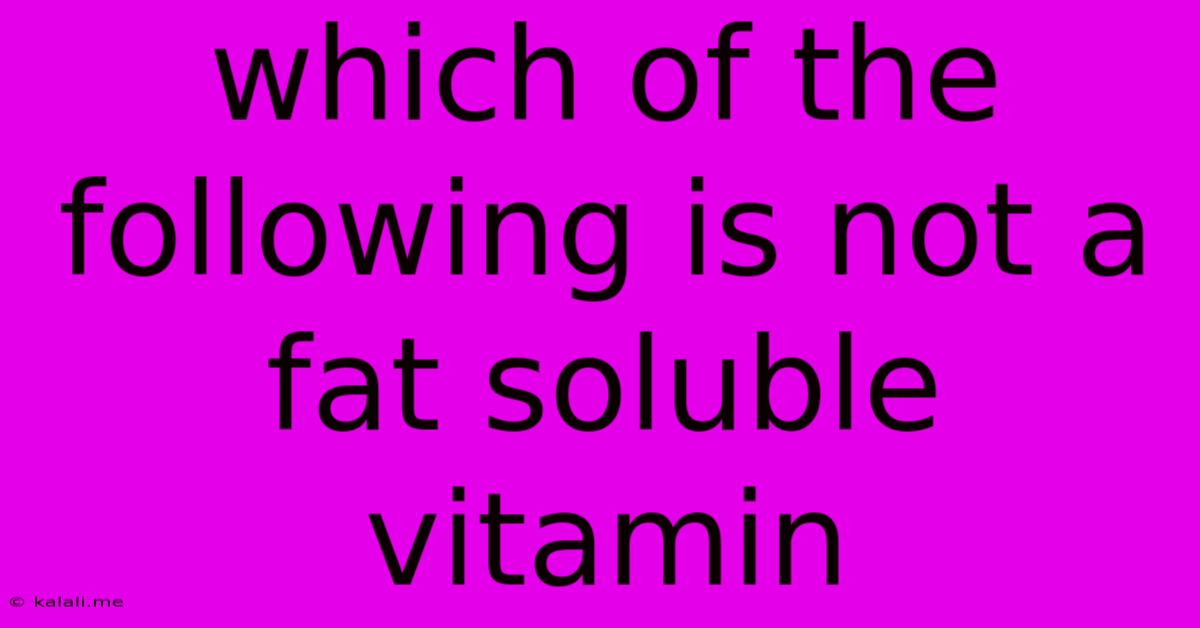Which Of The Following Is Not A Fat Soluble Vitamin
Kalali
Jun 12, 2025 · 2 min read

Table of Contents
Which of the Following is NOT a Fat-Soluble Vitamin? Understanding Vitamin Classifications
Vitamins are essential micronutrients our bodies need for various functions, but they're not all created equal. One key distinction lies in their solubility: fat-soluble and water-soluble. Understanding this difference is crucial for comprehending vitamin absorption, storage, and potential toxicity. This article will explore the characteristics of fat-soluble vitamins and pinpoint which of the commonly discussed vitamins isn't one of them.
What are Fat-Soluble Vitamins?
Fat-soluble vitamins, as their name suggests, dissolve in fat. This means they're absorbed along with dietary fats in the intestines. Because of this, they're stored in the body's fatty tissues and liver, meaning they're not readily excreted. This characteristic has both benefits and drawbacks:
- Benefits: Allows for a reserve supply, reducing the need for daily intake.
- Drawbacks: Increased risk of toxicity if consumed in excessive amounts. Water-soluble vitamins are easily flushed out in urine, mitigating this risk.
The main fat-soluble vitamins are:
- Vitamin A (Retinol): Crucial for vision, immune function, and cell growth.
- Vitamin D (Cholecalciferol): Essential for calcium absorption, bone health, and immune function. Often called the "sunshine vitamin" because the body can synthesize it upon sun exposure.
- Vitamin E (Tocopherol): A powerful antioxidant that protects cells from damage.
- Vitamin K (Phylloquinone & Menaquinone): Essential for blood clotting and bone health.
Which Vitamin is NOT Fat-Soluble?
Now, let's get to the core question: The vitamin that is not fat-soluble from the commonly known group is Vitamin C (Ascorbic Acid).
Vitamin C is a water-soluble vitamin, meaning it dissolves in water and is easily absorbed into the bloodstream. The body doesn't store significant amounts of Vitamin C, so regular intake is necessary. Excess Vitamin C is typically excreted in urine, reducing the risk of toxicity. This is in stark contrast to the fat-soluble vitamins.
Understanding the Implications
Knowing whether a vitamin is fat or water-soluble impacts how we approach our diet and supplement choices. For fat-soluble vitamins, consuming them with fats enhances absorption. Overconsumption can lead to accumulation and potential adverse effects. Water-soluble vitamins, like Vitamin C, require more frequent replenishment, but the risk of toxicity is considerably lower.
In summary: While Vitamins A, D, E, and K are all fat-soluble vitamins, Vitamin C is water-soluble, making it the correct answer to the question posed in the title. Understanding these differences contributes to a more informed approach to nutrition and overall health. This knowledge helps us make better choices to maintain optimal vitamin levels and avoid potential health problems.
Latest Posts
Latest Posts
-
University Of St Augustine For Health Sciences Acceptance Rate
Jun 13, 2025
-
Lasting For A Very Short Time
Jun 13, 2025
-
Which Of The Following Elements Has The Highest Electronegativity
Jun 13, 2025
-
The Speed Of Cpu Is Measured In
Jun 13, 2025
-
Sampling Error Vs Non Sampling Error
Jun 13, 2025
Related Post
Thank you for visiting our website which covers about Which Of The Following Is Not A Fat Soluble Vitamin . We hope the information provided has been useful to you. Feel free to contact us if you have any questions or need further assistance. See you next time and don't miss to bookmark.